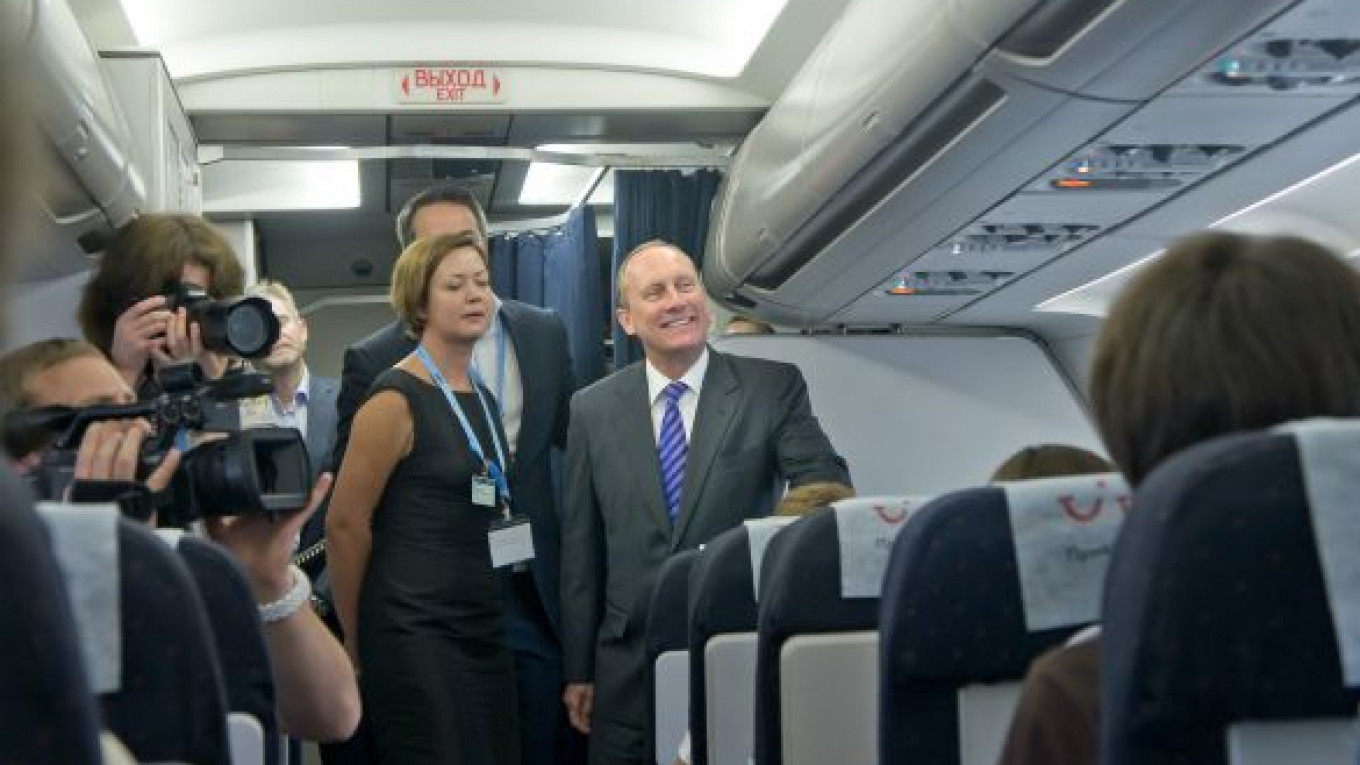DOMODEDOVO, Moscow Region — The passengers who boarded a plane at Moscow's Domodedovo Airport on Tuesday could take any seat they liked and weren't required to fasten their seat belts because the jet never left the gate.
The A-321, which did whisk a planeload of tourists out of the country later in the day, was presented to a group of journalists with a livery freshly painted in the white, red and light blue colors of TUI Russia, a Russian tour operator that has teamed up with the Kolavia airline to offer charter flights.
Under a three-year agreement, TUI Russia started flying three jets with its color scheme out of Domodedovo to popular tourist destinations in Spain, Turkey, Egypt, Croatia and Montenegro in late June.
The jets were provided by Kolavia and upgraded to TUI standards, with changes to crew uniforms and onboard service systems, said Chris Mottershead, managing director with TUI Russia and CIS.
The company spent about $1 million on rebranding the jets, he told a news conference on board the parked A321 as flight attendants passed out plastic glasses filled with sparkling wine. Paying passengers will also be offered the drink on takeoff on regular flights, he said.
Mottershead said the $1 million was part of a broader investment of "tens of millions of dollars" to open 300 offices across the country over the past two years.
TUI isn't the first local tour operator to repaint jets for its customers. Mouzenidis Travel, which focuses on tours to Greece, launched flights in April on board jets provided by Greek carrier Astra Airlines, which is co-owned by the tour operator, said Irina Tyurina, a spokeswoman for the Russian Tourism Union.
Mottershead said TUI Russia might subsequently acquire Kolavia, but noted that it was a remote possibility.
"Never say never. Anything may happen in the future. But today we're satisfied with our partnership," he said, adding that TUI Russia had an option to prolong the existing contract with Kolavia after the expiration of the three-year term.
Tyrina said few tour operators could afford to own an airline because the expenses were too high.
TUI Russia — a joint venture between Germany's largest tour operator, TUI, and metals billionaire Alexei Mordashov's S-Group Capital Management — is toying with the idea of expanding in the summer 2013 season and starting flights from the regions, Mottershead said.
He expects a jump in passenger numbers this summer, with Greece and Spain being among the most popular destinations.
Outbound passenger numbers are growing by an average of 15 percent every year, but financial problems facing some tour operators have undermined people's trust in these companies, Tyurina said by telephone, adding that many tourists now prefer to organize their vacations on their own.
The country's tourism industry has undergone a serious shake-up over the past year after a few travel companies stopped or suspended operations over financial problems.
In one high-profile example, Lanta-Tur Voyage announced in January that it was bankrupt, leaving about 3,000 tourists stranded around the world.
In a measure to protect tourists, the government amended federal law earlier this year to require tour operators to increase the amount of money available to clients in the event of bankruptcy or other financial problems.
According to the new rules, companies with annual revenues of less than 250 million rubles must have at least 30 million rubles set aside in a rainy day fund, while those whose revenues exceed that amount must hold 12 percent of their revenues in reserve.
Previously, companies had to set aside 60 million rubles if their annual revenues were less than 300 million rubles and just 100 million rubles if their revenues exceeded the amount.
The new requirements have turned out to be too much of a burden for big tour operators, some of which might end up losing their federal registration.
A total of 43 tour operators have revenues above 250 million rubles, but 13 of them haven't confirmed that they have set aside the necessary money, Izo Arakhamiya, head of Federal Tourism Agency's legal department, told journalists Monday.
She warned that they would be excluded from the federal registry over the next two weeks if they don't submit the needed documents by the deadline Wednesday.
Mottershead, of TUI Russia, supported the idea of greater government control, saying travel companies should prove that they have "adequate financial strength" to be licensed because otherwise Russian tourists will be unprotected financially.
A Message from The Moscow Times:
Dear readers,
We are facing unprecedented challenges. Russia's Prosecutor General's Office has designated The Moscow Times as an "undesirable" organization, criminalizing our work and putting our staff at risk of prosecution. This follows our earlier unjust labeling as a "foreign agent."
These actions are direct attempts to silence independent journalism in Russia. The authorities claim our work "discredits the decisions of the Russian leadership." We see things differently: we strive to provide accurate, unbiased reporting on Russia.
We, the journalists of The Moscow Times, refuse to be silenced. But to continue our work, we need your help.
Your support, no matter how small, makes a world of difference. If you can, please support us monthly starting from just $2. It's quick to set up, and every contribution makes a significant impact.
By supporting The Moscow Times, you're defending open, independent journalism in the face of repression. Thank you for standing with us.
Remind me later.






